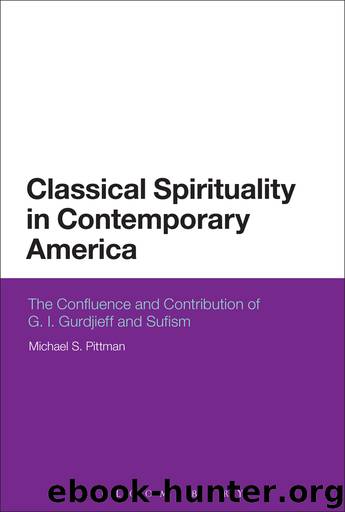Classical Spirituality in Contemporary America by Pittman Michael S

Author:Pittman, Michael S. [Pittman, Michael S.]
Language: eng
Format: epub
Publisher: Bloomsbury Publishing
Published: 2012-03-07T16:00:00+00:00
To me, the most interesting explanation was about man’s nature and the stages of his development. According to the dervishes, man has a three-fold nature—body, spirit, and soul; jesm , nefs , rukh . . . .The transformation of man takes place in his spirit—his nefs . There are seven gradations possible for man. (Journeys in Islamic Countries , 2000, p. 26)
The framework Hassan then provided of the seven levels of the soul surely resonated for Bennett, with Gurdjieff’s model of the seven types of men. Bennett later incorporated the model and some of the terminology into his own discourse about spiritual transformation. Presented as a complementary model to Gurdjieff’s discussion of the self, he makes use of elements of it in other works and talks, including The Dramatic Universe (1966) and his public talks recorded in A Spiritual Psychology (1964/1999) and presentations given to students at Sherborne House in the early 1970s, such as the talk on “The Master Idea of the New Epoch”(1974).
Another Sufi teacher that Bennett encountered on his first journey was a teacher named Emin Chikou, who lived in Baghdad and who was, Bennett reports, a Naqshbandi shaykh. As he reveals in his talks with Bennett, Chikou was preoccupied with the end times and the second coming of Christ. Bennett remarks that Chikou spent a great deal of time indicating the prophecies of the end times, as recorded in the sayings of Muhammad and other teachers, and he believed that the end times were imminent. Bennett remained unconvinced about the end of history, but told him that he believed, rather that we were entering a “New Epoch” in human history. Nonetheless, impressed with Chikhou, he records, “Though I could not accept his literal eschatology, I was deeply impressed by the man himself. I could speak with him as I had not been able to do with anyone—not even with Gurdjieff . . .” (1978a, p. 293). Bennett felt more personally connected to Chikhou and a feeling of mutual respect grew between them. Chikhou was another of the teachers Bennett met that seemed to confirm that Bennett was destined to play a role in bringing spiritual understanding to the West: “. . . he assured me that I would witness the coming of the Power of the Lord, and I had a special part to play in preparing the Western peoples to receive this Power. I could not bring myself to take these prophecies seriously, and yet I found Emin Chikou himself deeply impressive” (ibid: p. 294). Bennett also attended meetings with his students, who regarded Chikou with great veneration. What most impressed Bennett, however, was the sense of community and their devotion to service in the care of others—both of which corresponded to Bennett’s own values and ideals.
While the notion of the Masters of Wisdom had not come to dominate Bennett’s approach at this time, the focus on conscious labor and intentional suffering was confirmed in the words of the teachers he met. As has been
Download
This site does not store any files on its server. We only index and link to content provided by other sites. Please contact the content providers to delete copyright contents if any and email us, we'll remove relevant links or contents immediately.
The Five People You Meet in Heaven by Mitch Albom(3562)
The Secret Power of Speaking God's Word by Joyce Meyer(3184)
Real Sex by Lauren F. Winner(3016)
Name Book, The: Over 10,000 Names--Their Meanings, Origins, and Spiritual Significance by Astoria Dorothy(2983)
The Holy Spirit by Billy Graham(2944)
0041152001443424520 .pdf by Unknown(2843)
How The Mind Works by Steven Pinker(2813)
ESV Study Bible by Crossway(2774)
Ancient Worlds by Michael Scott(2682)
Churchill by Paul Johnson(2578)
The Meaning of the Library by unknow(2565)
The ESV Study Bible by Crossway Bibles(2550)
The Gnostic Gospels by Pagels Elaine(2528)
MOSES THE EGYPTIAN by Jan Assmann(2412)
Jesus by Paul Johnson(2352)
City of Stairs by Robert Jackson Bennett(2348)
The Complete Dead Sea Scrolls in English (7th Edition) (Penguin Classics) by Geza Vermes(2277)
The Nativity by Geza Vermes(2227)
Ancient Near Eastern Thought and the Old Testament by John H. Walton(2224)
